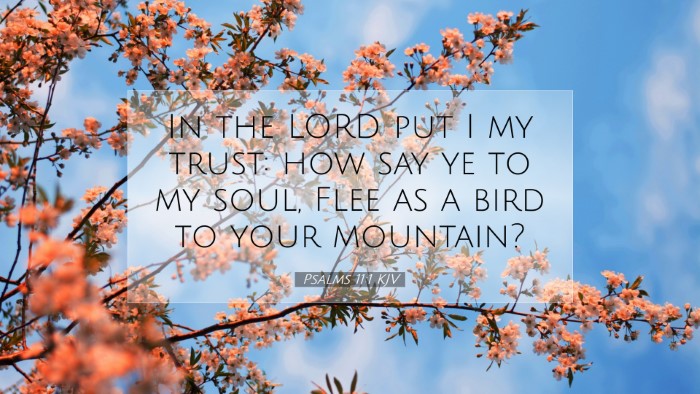Commentary on Psalms 11:1
Verse Text: “In the Lord put I my trust: how say ye to my soul, Flee as a bird to your mountain?”
Introduction
The psalmist begins with a direct statement of trust in the Lord, framing the discussion that follows with a tone of resilience and faith in God’s protection. In this commentary, insights from Matthew Henry, Albert Barnes, and Adam Clarke will illuminate the theological depth and personal application of this verse.
Textual Analysis
Understanding the Verse: The verse presents a contrast between the psalmist's unwavering trust in God and the fearful counsel from others to flee in times of distress. This highlights the tension between faith and fear, which is a central theme in many psalms.
Matthew Henry's Insight
Matthew Henry emphasizes the importance of trust in the Lord as the foundation of the believer's confidence. He observes that in times of peril, the temptation to escape or relocate for safety is a natural human response. However, Henry posits that true safety comes from reliance on God rather than fleeing to worldly refuges.
- Trust in Adversity: Henry points out that the psalmist’s declaration of trust reflects a deep-rooted faith that does not waver with circumstances.
- Advice of Friends: The phrase “how say ye” indicates that the counsel to flee came from those who may not understand God's providence, illustrating how the righteous may face misunderstanding from friends.
Albert Barnes' Perspective
Albert Barnes focuses on the implications of placing trust in God amidst adversity. He suggests that this trust manifests in various forms of spiritual fortitude and divine assurance.
- Fleeing as a Bird: Barnes implies that the imagery of a bird fleeing symbolizes a misguided approach to fear; it suggests abandoning one’s post of faith.
- Spiritual Reassurance: The psalmist’s resolve reflects a deeper understanding of sovereignty, encouraging believers to confront their fears rather than succumb to them.
Adam Clarke's Commentary
Adam Clarke provides a thorough exegesis of the text, delving deeper into the Hebrew language and cultural context of the psalm. Clarke notes that the commitment to trust in God is not merely a passive act but an active engagement with faith.
- Nature of Trust: Clarke elaborates on the nature of faith, suggesting that it requires a conscious decision to rely on God’s promises despite external pressures.
- Contextual Consideration: He points out historical allusions that may explain the distress the psalmist faces, encouraging an understanding of the practical applications of trust in God.
Theological Implications
This verse encapsulates key theological themes such as divine sovereignty, human frailty, and the nature of faith. The challenge presented by the psalmist serves to provoke deeper reflection on where one places their trust in times of crisis.
Divine Sovereignty
The affirmation of trust in the Lord suggests that believers recognize God’s ultimate control over every situation, promoting a worldview where God is seen as the ultimate refuge. As Henry notes, reliance on God supersedes the instinct to flee from danger.
Human Frailty and Fear
This passage reflects the vulnerability of even the most devout believers to fear and anxiety. The counsel to flee underscores the instinctive human reaction to danger. Yet, the psalmist’s response exemplifies a mature faith that transcends initial fear.
Practical Applications
For pastors, students, theologians, and scholars, this verse serves as a profound reminder of the call to trust God in all circumstances. It encourages thoughtful reflection on how one can cultivate a faith that withstands external pressures.
- Encouragement Amidst Trials: This verse can be a source of encouragement for those facing personal struggles, reminding them to place their trust in God's promises.
- Teaching Guardianship: Pastors may use this text to teach about God’s protective nature, emphasizing that fleeing from challenges is not the solution.
- Discerning Counsel: The distinction between divine counsel and earthly advice is crucial. This verse calls for wisdom in whom to listen during times of trouble.
Conclusion
Psalms 11:1 encapsulates a powerful message about the nature of faith, trust, and divine protection. By synthesizing insights from prominent commentators, we are reminded that the call to trust in God requires resilience and a commitment to spiritual truths, even when circumstances suggest otherwise. This psalm invites believers to reflect deeply on their sources of confidence and encourages a robust engagement with faith in times of uncertainty.


